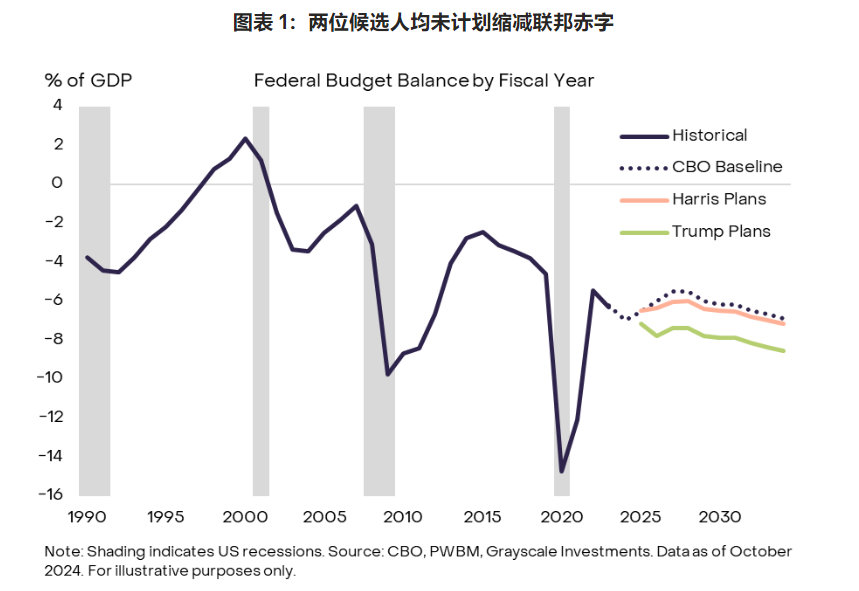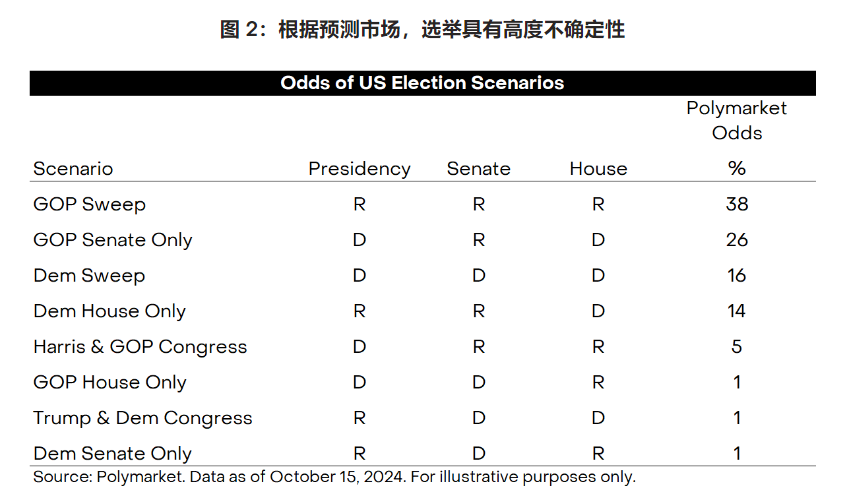- The outcome of the US election could have a significant impact on the digital asset industry. The next president and Congress may enact specific legislation targeting cryptocurrencies and may modify tax and spending policies that could affect broader financial markets.
- Current poll data and prediction markets (such as Polymarket) suggest the election is highly competitive. However, as of October 15, these data indicate that the likelihood of Republican control of the Senate appears higher. Grayscale Research believes that a change in Senate control is particularly important for the crypto industry, as the Senate plays a key role in confirming presidential appointments to key regulatory bodies (such as the SEC and CFTC chairs).
- However, from the perspective of the voter base, data shows that cryptocurrencies are a bipartisan issue, with slightly higher Bitcoin ownership rates among Democrats than Republicans. Additionally, specific candidates from both parties have expressed support for crypto innovation.
- Regardless of which party controls, Grayscale Research believes that comprehensive bipartisan legislation may be the best long-term solution for the US digital asset industry.
Although the 2024 US election involves many important issues, the digital asset industry has still managed to attract a certain amount of candidate time and attention. This can be partly attributed to changing voter preferences: in a nationwide survey commissioned by Grayscale and conducted by Harris Poll, we found that about half of likely voters would be more inclined to vote for candidates who show an interest in learning about and understanding cryptocurrencies, rather than those who do not have such an interest. The increased focus on cryptocurrencies also reflects the fact that US rulemaking lags behind other countries, even as the industry continues to evolve and innovate, making comprehensive legislation increasingly urgent.
Below, we will consider potential election scenarios for the White House and Congress and their possible impacts on the crypto market. For each outcome, we report the implied odds from Polymarket, a blockchain-based prediction market that has seen significant adoption this year.
White House
Polymarket Odds: Trump 57% / Harris 43% (as of October 15, 2024)
Key Points: A Trump victory could mean regulators will be more supportive of cryptocurrencies, while also increasing the budget deficit, both of which could be positive for Bitcoin and crypto. However, Trump's fiscal policy plans require Congressional support, and tariffs could introduce market uncertainty.
The next president will set the policy agenda for cryptocurrencies, nominate key regulators, and drive broader economic policy decisions on taxation, spending, and tariffs. Former President Trump has been enthusiastic about the digital asset industry, stating he wants to make the US the "cryptocurrency capital of the world." He has also announced plans to launch a crypto lending platform called "World Liberty Financial," though details on this project remain limited.
Vice President Harris has recently made more supportive statements about digital assets, explaining that her administration will "encourage innovative technologies like AI and digital assets, while protecting our consumers and investors." Her campaign team is also reportedly set to announce plans to "safeguard" crypto assets and develop "rules for cryptocurrencies and other digital assets."
However, Harris' campaign has provided fewer specifics, and it is notable that the current Biden/Harris administration has taken a confrontational approach to crypto industry regulation, including initiating a series of lawsuits, restricting access to traditional banking services, and vetoing bipartisan legislation. Therefore, Grayscale Research believes a Trump administration is more likely to nominate regulators willing to support crypto industry innovation.
Bitcoin's prospects may also depend on the macroeconomic policy choices of the next administration (see Bitcoin and the Macroeconomic Policy Choices of Biden vs. Trump for more details). Independent analysts' assessments indicate that both Trump and Harris's fiscal policy proposals would lead to larger budget deficits, even though the federal deficit is already quite large. Before incorporating campaign team plans, the Congressional Budget Office (CBO) projected that the federal deficit will average 6.2% of GDP over the next decade. According to the University of Pennsylvania's Wharton Budget Model (PWBM), Vice President Harris's proposed expansions of the child tax credit and other changes would increase the 10-year average deficit to 6.5% of GDP, though she plans to raise the corporate tax rate to 28%. Meanwhile, PWBM's analysis shows that former President Trump's plans to extend the 2017 tax cuts and lower other rates would increase the 10-year average deficit to 7.8% of GDP.
Grayscale Research believes that, all else equal, large budget deficits should be viewed as a negative factor for the US dollar and a positive factor for Bitcoin.

However, the actual market impacts are unpredictable. First, changes in fiscal policy must pass through Congress, and which campaign proposals will actually become law is unclear—especially in a divided government scenario. Second, former President Trump also plans to significantly raise tariffs. Tariff increases often strengthen the US dollar and could put pressure on risk assets, especially if other countries retaliate. While tariffs would not directly impact Bitcoin, the valuation of crypto assets is correlated with broader markets, so increased tariffs could pose downside risks to prices.
Senate
Polymarket Probability: Republican Control 78% / Democratic Control 22%
Summary: While both parties have members supportive of crypto policy in certain aspects, given the Senate's key role in confirming regulatory appointments, Republican control may be viewed as a net positive outcome for the crypto industry.
The Senate, along with the House, is responsible for passing any changes to fiscal policy as well as any crypto-specific legislation. The Senate also has the responsibility of confirming the president's appointments, including key regulatory bodies like the Securities and Exchange Commission (SEC), Commodity Futures Trading Commission (CFTC), and Federal Reserve. As the regulatory status of many crypto assets remains uncertain, the Senate's oversight of agency appointments could be crucial for the industry.
Current crypto-related legislation in Congress is bipartisan, including the Digital Commodities Consumer Protection Act in the Senate Agriculture Committee and stablecoin legislation in the Senate Banking Committee. At the same time, Republican senators have shown more consistent support for the digital asset industry. For example, the crypto industry lobbying group "Stand With Crypto" gave "A" ratings on crypto issues to 39 out of 49 Republican senators, compared to only 6 out of 51 Democratic senators. Voting patterns also indicate more Republican support: on the Senate vote to overturn the SEC's Staff Accounting Bulletin (SAB) 121, 48 Republicans voted in favor, compared to 12 Democrats.
Currently, Democrats control the Senate, and thus are responsible for chairing key committees, setting legislative priorities, and ultimately having a decisive vote on some presidential appointments. Given the generally stronger Republican support for digital asset innovation, Grayscale Research believes a change in Senate control could be a net positive outcome for the crypto market, and arguably the most important election result for the industry due to the critical role of regulatory oversight.
House
Polymarket Probability: Republican Control 44% / Democratic Control 56%
Summary: Control of the House is crucial in determining whether the government will be unified or divided, which will partly determine the next president's ability to enact their fiscal policy agenda, and thus also impact the broader financial market effects of the election.
Like the Senate, the House must support any changes to fiscal policy or crypto-specific legislation. The legislation currently being considered in the current Congress is bipartisan, but with stronger Republican support. For example, on the House Financial Services Committee's FIT21 bill, 208 voting Republicans joined 71 Democrats in supporting it, notably including Speaker Pelosi and Democratic Whip Clark.
The control of the House of Representatives will determine the committee allocations and legislative priorities of that chamber, which could impact crypto policy. But perhaps the most important impact is whether one party controls both the White House and both chambers of Congress - a "unified government" - or control is split between the parties - a "divided government". Under divided government, changes to fiscal policy may be particularly difficult to achieve.Eight Scenarios
In the upcoming U.S. elections, there are three institutions (the White House, the Senate, and the House of Representatives) and two possible outcomes for each (controlled by Republicans or Democrats). This results in eight different possible scenarios, each with varying implications for the digital asset industry. Exhibit 2 provides the implied probabilities for each scenario from Polymarket.

Grayscale Research highlighted a few key points. First, none of the four more likely scenarios clearly dominate - in other words, the post-election balance of power remains highly uncertain. Second, observers are divided on whether we will face a unified or divided government: the combined probability of a Democratic or Republican sweep is still close to 50%. Third, based on Polymarket data, the only specific outcome with relatively high probability is a Republican-controlled Senate. As long as this holds, we would view the election outcome as favorable for the crypto market, as the Senate plays a key role in confirming presidential appointments.
Crypto is a Bipartisan Issue
At the voter level, crypto is a bipartisan issue. Our national survey conducted by Harris Poll on behalf of Grayscale shows that self-identified Democratic voters have higher Bitcoin ownership and familiarity with crypto than Republican voters, and Democratic voters' interest in crypto has generally increased this year. Moreover, any new crypto legislation would require supermajority support in the Senate, and thus almost certainly bipartisan support.
Nevertheless, Grayscale Research views a Republican-controlled Senate as a meaningful positive signal for the digital asset industry, given the Senate's key role in confirming presidential regulatory appointments. Thus, the current polling and prediction market implied probabilities currently point to an outcome favorable for crypto markets.
However, the prospects for any specific crypto-related legislation and/or potential changes to fiscal policy under the next administration remain more uncertain. In Grayscale Research's view, the best outcome for the healthy development of the digital asset industry is continued bipartisan collaboration towards comprehensive legislation.
Harris Poll Methodology
This survey was conducted online by The Harris Poll on behalf of Grayscale from September 4-6, 2024 among 1,841 U.S. adults (aged 18 and over) who plan to vote in the 2024 presidential election. Data were weighted as necessary by age, gender, race/ethnicity, region, education, marital status, household size, household income, employment, and internet tendency to align with actual population proportions. Respondents for this survey were selected from among those who have agreed to participate in our surveys. The Harris Online sample's precision is measured using Bayesian credible intervals. For this study, the sample data are accurate to within +/- 2.8 percentage points at a 95% confidence level. This credible interval will be wider among subsets of the interested population. All sample surveys and polls, regardless of whether they use probability sampling, may be subject to multiple sources of error which are often not possible to quantify or estimate, including but not limited to coverage error, error associated with nonresponse, error associated with question wording and response options, and post-survey weighting and adjustments.







